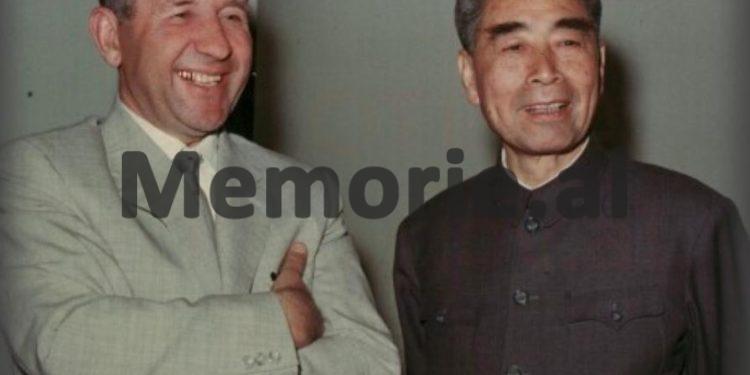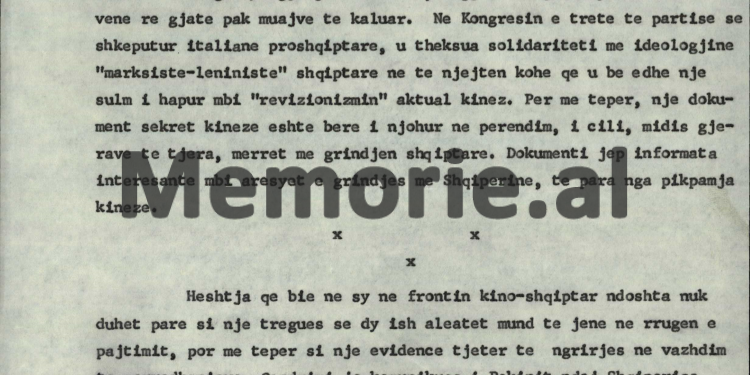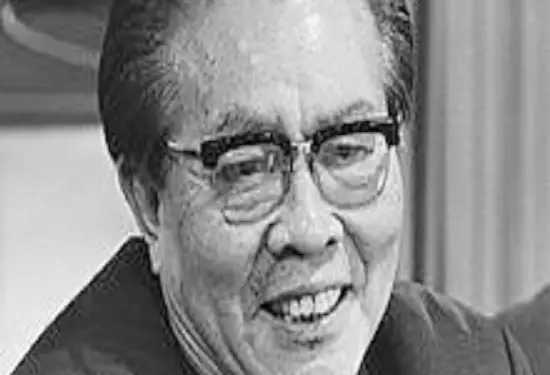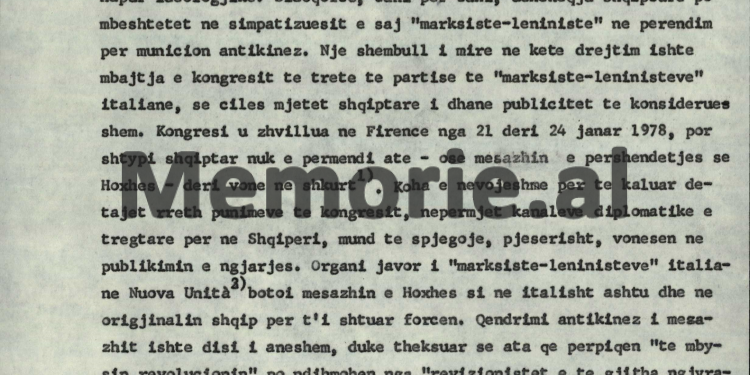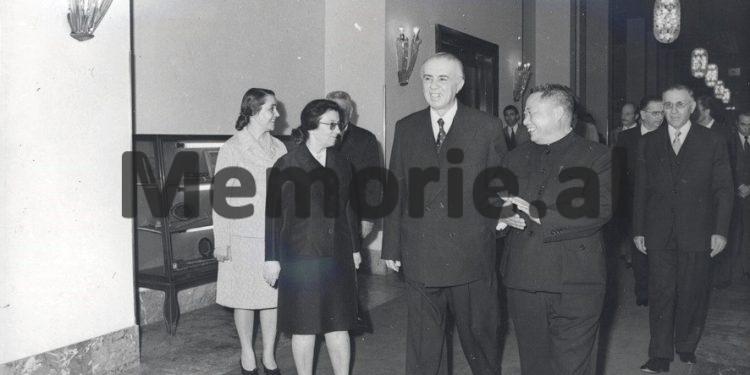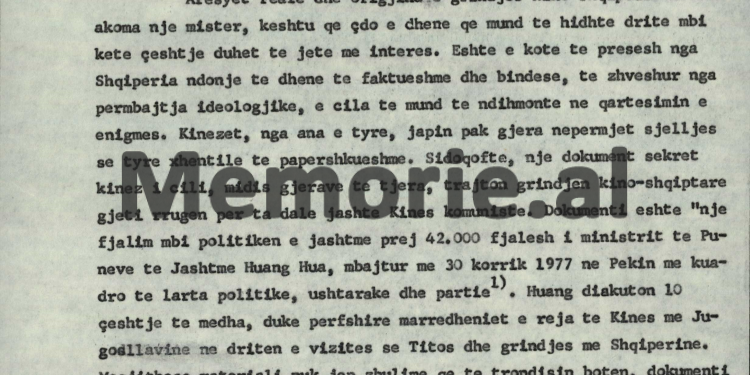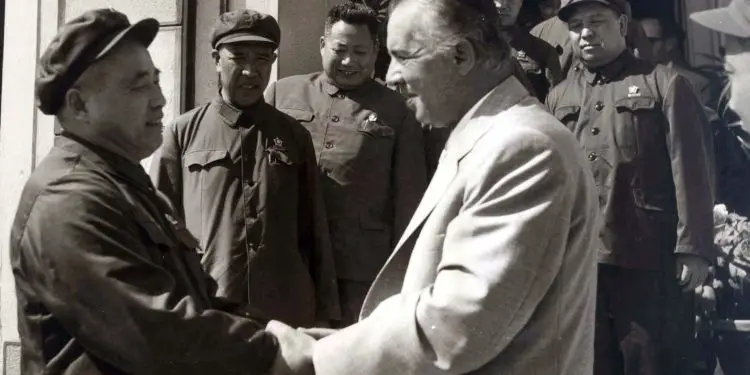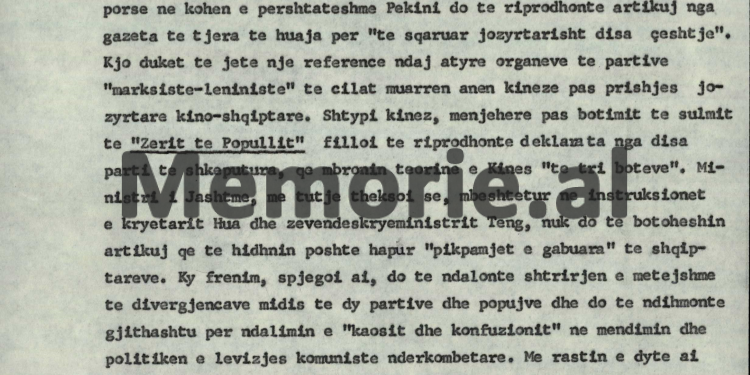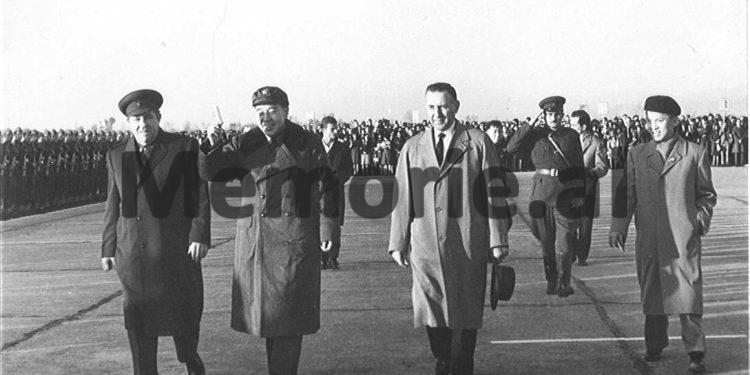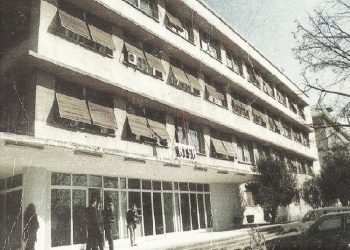Dashnor Kaloçi
Second part
Memorie.al/publishes some archival documents with the secret signature, extracted from the Central State Archive in Tirana (the fund of the former PPSh Central Committee), which belong to 1977 and are part of a file containing a correspondence between the Albanian embassy in Vienna and the apparatus of the Central Committee of the PPSh (Foreign sector), where it is about a material with comments made by Radio “Free Europe”, regarding the contradictions and the breakdown of official relations between the People’s Republic Socialists of Albania and the People’s Republic of China. In the documents in question, the Albanian ambassador Zihni Haskaj first explains the circumstances of how it became possible to find that material that was provided through the head of the office of the French news agency in Vienna, to whom he was able to secretly take it and photocopy it , Wilfred Graff, the friend of our country and one of the members of the Austria-Albania Friendship Association. According to Ambassador Haskaj, the material that was broadcast by Radio “Free Europe” was prepared by the journalist Luis Zanga, in which, among other things, it was said: Here Hua replaces the direct language, with an M-L analysis of the war of last for power in Albania. Of course, Albanians do not need to have a copy of Hua’s speech to prove the Chinese connection with the purged elements. Prime Minister Mehmet Shehu himself was the one who, in November 1977, gave an understanding of Beijing’s connection with the opposition in Tirana, when he said: “We know very well and have documented the origin of the pawns, of Beqir’s coup plot Balluk, Abdyl Këllez and other putschists, who wanted to overthrow the dictatorship of the proletariat in Albania and establish a bourgeois-revisionist regime here.
Continues from last issue
The document with the complete material prepared by the journalist Louis Longa and broadcast by Radio ‘Evropa e Lirë’, on the contradictions and breakdown of official relations between the People’s Socialist Republic of Albania and the People’s Republic of China
RADIO ‘FREE EUROPE’ – Study
Basic report 56 / RD
(Albania)
March 21, 1978
TWO INTERESTING DEVELOPMENTS IN THE SINO-ALBANIAN CONTROVERSY
By Louis Zanga
Content: The deterioration of Sino-Albanian relations continues, as evidenced by the last two events, despite the decrease in controversy observed over the past few months. In the third Congress of the breakaway Italian pro-Albanian party, solidarity with the Albanian “Marxist-Leninist” ideology was emphasized at the same time that there was also an open attack on the current Chinese “revisionism”.
Moreover, a secret Chinese document has been made public in the West, which among other things, deals with the Albanian dispute. The document provides interesting information on the reasons for the conflict with Albania, seen from the Chinese point of view.
The conspicuous silence on the Sino-Albanian front should probably not be seen as an indication that the two former allies may be on the road to reconciliation, but rather as another evidence of the ongoing freezing of relations. Beijing’s non-communicative attitude towards Albania is a matter of official policy aimed at preventing a further deterioration of relations and, hence, China’s silence is not a surprise. Tirana’s calm behavior, on the other hand, seems to be dictated by strategic considerations.
Apparently, the Albanian leadership felt they needed a rest after their aggressive campaign of anti-Chinese polemics during the second half of 1977. Moreover, Albania had acute internal problems to resolve. , mainly of an economic nature, which in themselves are a consequence of the destruction of the destruction of Sino-Albanian friendship. Moreover, the almost complete embargo of Albanian funds for everything related to China reflects a further hardening of Tirana’s policy towards Beijing.
The Italian breakaway party attacks the Chinese.
It is entirely possible that after the quiet winter months, the Albanians will return to their usual style of ideological warfare. However, for now the Albanian leadership is relying on its “Marxist-Leninist” sympathizers in the West for anti-Chinese “ammunition”.
A good example in this direction was the holding of the III Congress of the Italian “Marxist-Leninist” Party, to which the Albanian media gave considerable publicity. The congress took place in Florence, from 21 to 24 January 1978, but the Albanian press did not mention it, – or Hoxha’s greeting message – until late in February.
The time needed to pass the details about the congress proceedings, through diplomatic and commercial channels to Albania, can partially explain the delay in the publication of the event. The weekly organ of the Italian “Marxist-Leninists”, “Nuova Unita”, published Hoxha’s message both in Italian and in the original Albanian, to increase its strength.
The anti-Chinese stance of the message was somewhat biased, emphasizing that those who are trying to “suppress the revolution” are being helped by revisionists of all colors. This is a form that is often used by Albanians, to include by deduction the Chinese, among today’s “revisionists”.
Hoxha’s cautious tone may indicate that, for now, he wants to avoid a further tightening of relations with Beijing, which could lead to complete political and economic isolation of Albania. He also probably does not want to take responsibility for a further deterioration in relations, leaving it to Beijing to make the next move.
Since the Italian secessionist party has been left aside by the Chinese leadership, because it has taken the Albanian side, unlike Albania, this party is not hindered by considerations of state reasons (Raison d’etat), and therefore has nothing to lose under adopting an open anti-Chinese line. The document published at the end of the congress states:
“All the theories that refute the class struggle are totally wrong. Some theories, such as the “Three Worlds” theory propagated by Chinese revisionism, cannot form the strategic line of a Marxist-Leninist party. The “Three Worlds” theory is a revisionist theory, a variant of Khrushchevian revisionism, which at one time was accepted by the Chinese Communist Party headed by Comrade Mao Zedong.
Any concession in this field leads to political opportunism and is in opposition to the general line of the international communist movement, which is defended by the “Marxists-Leninists” and mainly by the Albanian Labor Party, led by Comrade Enver Hoxha. This line, applied to current conditions, is as valid today as it was in the past.
The message of the loyalists of Tirana in Italy is clear: They emphasize that with the death of Mao Zedong and the subsequent betrayal of the revolutionary theory of the new Chinese leadership, it is Enver Hoxha who has now assumed the role of revolutionary leadership “Marxist-Leninist”, left empty by the late Chinese leader.
The document’s concluding statement further emphasizes this point:
The “Marxist-Leninist analysis” made by Comrade Enver at the 7th Congress of the Labor Party of Albania is of fundamental importance. It is the duty of the Marxist-Leninists to remain firm in these positions and defend them from the attacks of the modern revisionists”.
The open challenge to the new Chinese leadership by the former Italian “Maoists” leaves no room for compromise. Considering that Albanian ideological politics played an important role in the congress, it can be thought that Tirana also has the opportunity, at an opportune moment, to take the big step of extending its challenge to the new Beijing leadership.
Secret Chinese document sheds light on the row
The real reasons and origins of the Sino-Albanian feud still remain a mystery, so any data that could shed light on the matter should be of interest. It is futile to expect from Albania any determinable and convincing data stripped of ideological content, which could help clarify an enigma. The Chinese, for their part, give little by way of their indescribably gentile behavior.
However, a secret Chinese document, which among other things deals with the Sino-Albanian dispute, found its way out of Communist China. The document is: “a speech, on foreign policy, of 42,000 words by the Minister of Foreign Affairs, Huang Hua, held on July 30, 1977, in Beijing, with political, military and party cadres. Huang discusses 10 major issues, including China’s new relations with Yugoslavia, in light of Tito’s visit and the dispute with Albania.”
Although the material does not provide world-shattering revelations, the document is undoubtedly remarkable for the light it sheds on the matter at hand. It is, of course, almost impossible to prove its authenticity, but the authoritative content of the material, the tone and the details, lead experts to believe that it is genuine.
Among the first to report on the document was West German newspaper Frankfurter Allgemeine Zeitung’s China specialist Harry Hamm, who noted that observers of Chinese affairs were in no doubt as to its authenticity his.
By Chinese Communist standards, Huang Hua’s speech was an extraordinary lecture in which he occasionally flattered, threatened, used folklore, or quoted proverbs to drive home the point. He began the part dealing with the Albanian conflict, referring to the attack of the article of “Voice of the People”, of July 7, 1977 and the fact that the Albanian embassy in Beijing had distributed copies of that article to all foreign embassies.
He noted that the Chinese press had not published the article, but that at the appropriate time, Beijing would reproduce articles from other foreign newspapers to “informally clarify some issues.” This must be a reference to those organs of the “Marxist-Leninist” parties, which take the Chinese side, after the unofficial Sino-Albanian break. The Chinese press, immediately after the publication of the “Voice of the People” attack, began to reproduce statements from several breakaway parties, which defended China’s “Three Worlds” theory.
The foreign minister further emphasized that, based on the instructions of President Hua and Deputy Prime Minister Teng, articles that would openly refute the erroneous views of “the Albanians” would not be published.
This restraint, he explained, would stop the further spread of divergences between the two parties and peoples and would also help to stop “chaos and conclusion” in the thought and policy of the international communist movement.
In the second case, he obviously had in mind the “Marxist-Leninist” movement, as the example of the Congress of the Italian Breakaway Party shows, which has actually been destroyed.
“As we did not want to aggravate a controversy which would only cause ‘sorrow to our friends and pleasure to our enemies’, we have, at the same time, followed the late Chairman Mao’s injunction to maintain friendship between the Chinese and Albanian comrades as strongly as possible, as we would protect our own eyes”. Memorie.al
The next issue follows




